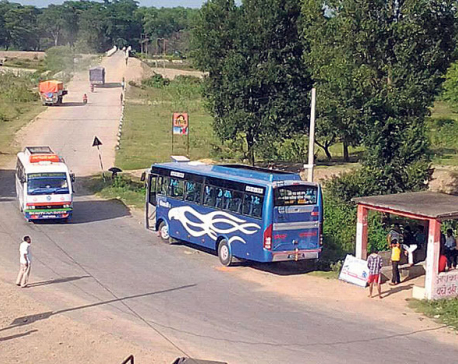
OR
End of transport syndicate can bring down price of daily consumables
Published On: April 23, 2018 06:30 AM NPT By: Rudra Pangeni | @rudrapang
Biz leaders say it will also reduce cost of doing business
KATHMANDU, April 23: Transport syndicate is not only increasing travel prices and affecting quality of public transportation. This unholy nexus of transporters is also affecting prices of daily consumables like food materials and vegetables as well as fuel and apparel.
This is because truckers' syndicate fixes the cost of transportation service, killing competition among truckers which could have brought transport fare down. This high transport fare increases cost of daily consumables which is ultimately passed on to end consumers. Not only that, syndicate is also increasing cost of doing business for industries and business enterprises.
“We are paying transport fare of up to Rs 50,000 per truck during peak season of construction, while the fare is only around Rs 20,000 in the lean season,” Shree Krishna Rijal, president of Nepal Construction Material Dealers Association, said. “This is not because of demand-supply situation. It is because the fare is fixed by syndicate of truckers.”
The syndicate collects transport demand from us as well as industrialists and importers, and allot trucks for transport, Rijal said, adding that fares are also fixed by the syndicate.
Syndicates have made all trucks to joint their fold so that they can enjoy monopoly in the market.
President of Nepal Chamber of Commerce (NCC), Rajesh Kaji Shrestha, said that there is no competition in transportation service in Nepal. Welcoming the government's move of ending all types of syndicate of transporters, he said that open competition will help bring down transportation fare and ultimately price of everyday consumable goods.
The government last week announced that it would not renew registration of transporters' committee, urging them to register themselves under Company Registration Act.
Hari Bhakta Sharma, president of Confederation of Nepalese Industries (CNI), said that transportation syndicate is one of the factors behind higher cost of doing business in Nepal.
The cost of doing business in Nepal is one of the highest in the South Asia, and Nepali products are not competitive compared to products of China and India.
“Syndicates in transportation sector have worsened service quality. You have to pay higher price and the services are also not prompt,” Sharma said, welcoming the government move to eradicate syndicate in transportation sector.
“End of syndicate in transport sector can enhance efficiency of our economy. I see GDP increasing by at least one percent if all efforts are put to curb syndicates of transporters across the country.”
Price of vegetables differs greatly from farms in Kavre and Dhading, for example, to local markets in Kathmandu Valley. Traders say one of the reasons is higher transport cost imposed by the syndicate of transporters.
When reconstruction works took momentum in January, truckers had increased transport cost unilaterally, forcing manufacturers of construction materials like cement and steel to jack up prices of their products.
You May Like This

'Don't release transport entrepreneurs if they don't agree to end syndicate'
KATHMANDU, May 6: Ram Bahadur Thapa, Ministry for Home Affairs has directed not to release the arrested transport entrepreneurs if... Read More...

Govt promises tough measures to end transport syndicate
KATHMANDU, April 2: In a bid to break transport syndicates highly prevalent in the country, the Department of Transport Management (DoTM)... Read More...

With end of syndicate, new era of transport dawns in Dang
DANG, Sept 28: Small-sized short-route buses were not catering to the growing needs and expectation of Dang’s residents. ... Read More...




Just In
- Navigating the Digital Diplomacy Divide: Balancing Tradition and Technology in Global Relations
- Youth attempts suicide amid police torture over Facebook comments against home minister
- Time to declare EVMs’ end
- World Malaria Day: Foreign returnees more susceptible to the vector-borne disease
- MoEST seeks EC’s help in identifying teachers linked to political parties
- 70 community and national forests affected by fire in Parbat till Wednesday
- NEPSE loses 3.24 points, while daily turnover inclines to Rs 2.36 billion
- Pak Embassy awards scholarships to 180 Nepali students














Leave A Comment